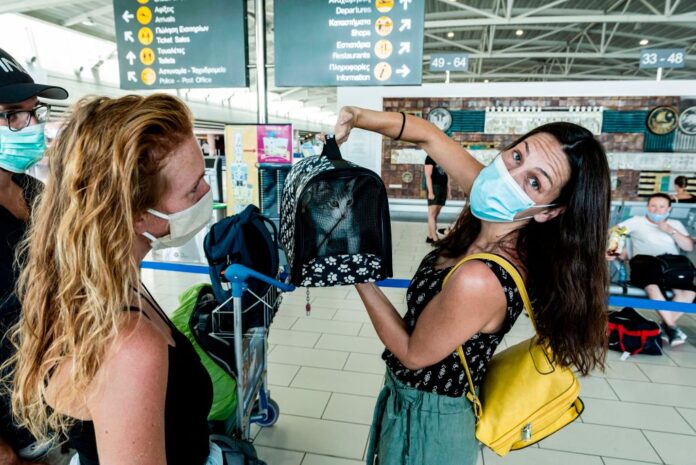A traveler holds a cat lying in a carrier as she stands inside the terminal at Cyprus’ Larnaca International Airport on Aug. 1, 2020.
Iakovos Hatzistavrou/AFP via Getty ImagesA quick way to make an enemy out of a stranger during this Thanksgiving travel season is to hold up the security checkpoint due to any kind of mishap — but especially one with your house pet.
That’s why a worker with over a decade of experience at San Francisco International Airport reached out to SFGATE to share tips for how to best travel with a pet. (As an employee of Covenant Aviation Security [CAS], a company that staffs the TSA checkpoints at SFO, they requested anonymity since they were told not to contact the press except through official channels.)
Advertisement
Article continues below this ad
In all their years working the checkpoint, they said the toughest animals to process are, in fact, far more domestic than exotic. “At SFO, I have screened cats, dogs, a baby kangaroo, a baby walrus and a baby alligator. The exotic animals belonged to zoo keepers,” the CAS employee said. But the hardest pet to deal with? The humble house cat.
Cats, it turns out, sometime bite and scratch their owners when removed from their carrier so a CAS officer can inspect it. Moreover, cats are quick and can create a line backup when they scuttle away.
“Cats, when they are frightened, take off,” the CAS employee said. “That happened on Thursday. I saw a lady run as fast as she could. Somebody else had a frisky dog who wasn’t … ‘house broken.’ Clean up, lane two! And now multiply that by 50 on Thanksgiving weekend.”
The CAS employee said the best way to avoid this issue is to acclimate the pet before traveling. Practice carrying the animal in the crate a few times so that it has experience with the process. Put them in the carrier for short lengths of time to get them familiar with it and feeling comfortable.
Advertisement
Article continues below this ad
When the time comes to go through airport security, prearrange with the airline. If the pet is traveling with you on the flight, consider using a leash to avoid having to run after the animal if it gets out. Or worse, in case it sends you to seek medical treatment before a flight. (Some airlines require large pets to travel in the cargo hold in a portable kennel, which is called “shipping” your pet.)
“People who travel on holidays are not frequent travelers typically and don’t quite understand that their cat has to be in a carrier for hours,” the CAS employee said. “The headaches for having to send people to a first aid station due to their own pet tearing them up is totally unnecessary.”



